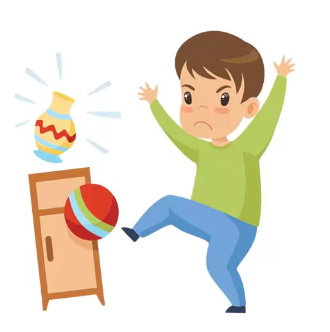Oppositional Defiant Disorder, abbreviated as ODD, is a behavioral malady typified by a chronic display of defiant, disobedient, and antagonistic comportment towards figures of authority. This encompasses parents, educators, and other adults. It transcends mere sporadic misbehavior that many children exhibit; it’s an enduring condition that can profoundly disrupt a child’s quotidian existence.
Why is it pivotal to comprehend ODD? Early recognition and intervention of ODD can forestall more severe behavioral quandaries in the future, ameliorate familial interactions, and enhance the child’s overall quality of life.
Symptoms of ODD
Behavioral Symptoms
Children diagnosed with ODD frequently manifest specific consistent behaviors. These encompass recurrent temper outbursts, excessive quarrelling with adults, deliberate endeavors to irritate or upset individuals, and attributing their mistakes or misconduct to others. They might also display spiteful or vindictive tendencies.
Emotional Symptoms
Emotionally, children with ODD are often easily vexed, harbor feelings of anger and resentment, and are typically irritable. They might suffer from low self-esteem and are susceptible to mood fluctuations.
Causes and Risk Factors of ODD
Genetic Factors
Evidence suggests that ODD may be hereditary. A familial history of mental health disorders can predispose a child to developing ODD.
Environmental Factors
Environmental influences such as inconsistent discipline, inadequate supervision, or exposure to violence and substance abuse can contribute to the emergence of ODD.
Psychological Factors
Psychological aspects like possessing a difficult temperament or experiencing significant stress or trauma can also be contributory.
Diagnosis of ODD
Diagnostic Criteria
Diagnosing ODD entails a thorough evaluation by a mental health professional. They employ specific criteria delineated in the Diagnostic and Statistical Manual of Mental Disorders (DSM-5) to ascertain if a child meets the requirements for ODD.
Assessment Tools
Various assessment instruments, including behavioral checklists and interviews with the child and their caregivers, aid in the diagnostic process.
Role of Healthcare Professionals
Psychologists, psychiatrists, and pediatricians are instrumental in diagnosing ODD. They gather comprehensive histories, conduct interviews, and may observe the child in diverse settings.
Impact of ODD on Daily Life
Effects on Family Dynamics
ODD can strain familial relationships. Parents may feel overwhelmed, and siblings might feel neglected or fearful. The perpetual conflict can create a tense home environment.
School and Social Challenges
Children with ODD often face difficulties in school due to their defiant behavior, leading to academic underachievement and strained relationships with teachers and peers.
Long-term Consequences
If untreated, ODD can lead to more severe issues like conduct disorder, substance abuse, and even criminal behavior in adulthood.
Treatment Options for ODD
Behavioral Therapy
Behavioral therapy aims to transform negative behaviors into positive ones. Techniques include positive reinforcement and structured routines.
Parent-Child Interaction Therapy (PCIT)
PCIT involves real-time coaching of parents to enhance their interactions with their child, fostering positive behavior and mitigating negative ones.
Medication Management
In some instances, medications might be prescribed to manage symptoms, particularly if the child has co-occurring conditions like ADHD or anxiety.
Preventive Measures
Early Intervention
Identifying and addressing behavioral issues early can prevent the escalation of ODD symptoms.
Positive Parenting Practices
Utilizing positive parenting techniques such as praise, setting clear expectations, and being a good role model can reduce the likelihood of ODD developing.
Community Resources
Leveraging community resources like counseling services, parenting classes, and support groups can provide additional support.
Role of Schools in Managing ODD
Creating Supportive Environments
Schools can create supportive environments by implementing behavioral plans tailored to individual students’ needs.
Teacher Training Programs
Training teachers to recognize and manage ODD can improve classroom dynamics and student outcomes.
Collaboration with Parents
Open communication and collaboration between schools and parents are essential for effectively managing ODD.
Living with ODD: Stories of Hope
Success Stories
Numerous families have successfully managed ODD through various interventions and support, leading to significant improvements in behavior and relationships.
Inspirational Experiences
Sharing inspirational experiences can provide hope and motivation to those currently grappling with ODD.
Overcoming Challenges
With the right strategies and support, many children with ODD can surmount their challenges and lead fulfilling lives.
Myths and Misconceptions about ODD
Common Misunderstandings
There are several misconceptions about ODD, such as it being merely a phase or a consequence of poor parenting.
Facts vs. Fiction
Educating the public about the realities of ODD can help dispel myths and reduce stigma.
Educating the Public
Raising awareness about ODD can lead to greater understanding and support for affected families.
Support Groups and Resources
Finding Local Support
Local support groups can provide face-to-face interaction and support.
Online Communities
Online communities offer a platform for sharing experiences and advice.
Professional Organizations
Organizations like the American Academy of Child and Adolescent Psychiatry provide valuable resources and information.
Conclusion
Understanding and managing Oppositional Defiant Disorder necessitates a holistic approach involving early diagnosis, effective treatment, and ongoing support. With the right strategies, children with ODD can lead successful, fulfilling lives. Educating ourselves and others about ODD can help create a more supportive environment for those affected.
FAQs about ODD
- What is the difference between ODD and typical childhood defiance?
ODD involves a persistent pattern of defiant behavior that is more severe and frequent than typical childhood defiance and disrupts daily functioning.
- Can ODD be outgrown?
While some children may outgrow ODD, others might continue to experience symptoms into adolescence and adulthood, especially without intervention.
- How can teachers help students with ODD?
Teachers can help by creating structured, supportive classroom environments, using positive reinforcement, and collaborating with parents and mental health professionals.
- Are there any effective home remedies for managing ODD?
While professional treatment is crucial, home strategies like consistent routines, clear expectations, and positive reinforcement can help manage symptoms.
- What should parents avoid doing when dealing with a child with ODD?
Parents should avoid inconsistent discipline, harsh punishment, and reacting emotionally to defiant behavior, as these can exacerbate symptoms.





